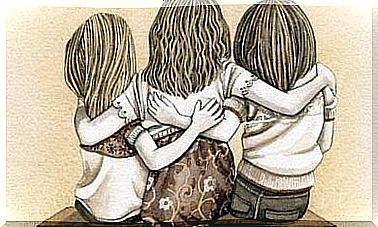Avoidance Will Make You Feel Worse

We have all been through situations that caused us so much discomfort that the only thing we wanted to do during those times was to escape. We will explain here why this avoidance, which may at first appear to be the best defense mechanism, is particularly harmful to us, especially in the long term.
In addition, we will not only talk about the prejudices that this form of confrontation can cause but also about the behaviors that it is recommended to lead instead of avoidance. Avoidance behaviors which only seek to remove the possibility of exposure to the situation which is perceived as unpleasant, or even painful.
“I learned that you can’t go back, that the essence of life is to move forward. Life, in reality, is a one-way street. “
-Agatha Christie-
What is avoidance?
When we find ourselves in situations that we deem threatening, we all present a series of coping strategies to deal with them. These are configured and anchored in us throughout life. If they are useful under certain conditions, we will tend to increase their frequency of use and even adapt them to new problems for which, at the beginning, they do not seem to be the most suitable. On the contrary, if they seem ineffective, we will tend to eliminate them from our repertoire.

Starting from this basis, there are different types of strategies that can be put in place. One of them would be avoidance, and within avoidance we can distinguish anticipatory avoidance and flight. In the first case, we anticipate an unpleasant situation and do everything possible to get away from it. In the second case, we are already at the heart of an unpleasant situation and we are focusing all our energy on trying to escape it.
When possible, avoidance behaviors have the virtue of restoring calm. In the short term, they rely on that strength, which in many cases is very powerful: immediate relief from those unpleasant feelings. So, people will continue to implement this strategy whenever something makes them feel bad. In this way, they will avoid more and more situations in the different areas where they can arise, making their life more and more conditioned by fear.
This way of dealing with situations is taken into account when dealing with various emotional disorders. If this behavior changes, it will significantly promote the recovery of psychological well-being.
How to deal with situations that cause us discomfort?
If, in the long run, resorting to avoidance of what causes us discomfort is actually harmful to us, what can we do? Do we have to give up and give in to suffering? No, because there are other ways of dealing with a situation, which do not end up being a serious limitation on our lives.

Folkman and his colleagues (1986) made a classification of the different types of confrontation:
- : alter the situation that causes us discomfort through direct or even aggressive acts, with hostile and risky attitudes.
- : moving away from the situation but without getting out of it, so that we can enrich the perspective we have of it.
- : the ability to activate the emotional regulation strategies that we have.
- : trying to get others to inform us, advise us and understand us.
- : as we have already seen, it supposes to flee the situation concretely.
- : analyze the situation to find the alternatives that can be used.
- : seeing the situation as a challenge that helps us to develop ourselves personally, instead of seeing it as a threat to our stability.
“Think of annoyances as an exercise”
-Sénèque-
From this follows the fact that it is not only wrong to act with avoidance, but also that other types of strategies would not be appropriate either. Hostile and aggressive confrontation would be an example.
However, a distancing that allows us to control ourselves, reassess the situation in a positive way, plan the actions we are going to take, and seek social support (without coming to the point of depending on others for everything) can be beneficial. This is clear, as long as we don’t have to act quickly.
As we see, it is rather a question of using with intelligence the various strategies which we have at our fingertips. So avoiding certain situations may be a prudent strategy, but we cannot move forward in life by jumping over puddles when it rains a lot. In fact, if we insist on this avoidance strategy, we will end up stranded in one place, praying that water does not pool in the small space we occupy and without having learned a thing on the way. .
On the other hand, if we insist on developing forms of confrontation with which we do not avoid challenges, we will develop our sense of self-efficacy that arises when we do things well. Therefore, our self-esteem will also be strengthened.








